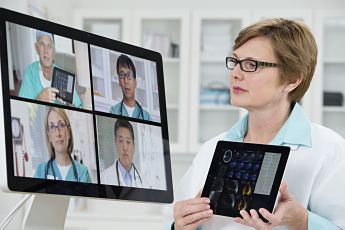Janssen’s approach to Continuous Professional Development of Healthcare Professionals

At Janssen, we believe that sponsoring and supporting Continuous Professional Development (CPD) programmes for healthcare professionals (HCPs) is part of our responsibility for the medicines we develop. By increasing knowledge about diseases and the latest standards of care, these programmes enhance medical practice as well as patients’ outcomes and deliver long-term benefit to society.
Through our CPD programmes, we aim to contribute to high quality, unbiased and transparent education in true partnership with the medical community, to ensure that important new medical advances are discussed in a variety of settings from international congresses to smaller educational meetings. Strict company principles ensure that this happens in an unbiased way and spell out clear procedures on our interactions with individual HCPs, as well as those with medical societies and institutions.
At Janssen, our CPD (also known as Continuous Medical Education or CME) activities are tightly regulated and transparent. For us, there are three types of activities:

1-Congress support - We provide financial support in the form of grants and sponsorships to the major national and European congresses. This is because congresses provide HCPs with critical information on medical advances, and this knowledge is essential for improving patient care.
The educational meetings we support must foster scientific exchange and disseminate the latest standards of care to facilitate safe and effective treatment for patients. Some of these meetings are qualified by accreditation bodies, and some are not.
At Janssen we apply the same quality rules to both. Janssen follows the national regulations in regards to event accreditation and Health Authority endorsement.

2-Medical education programmes – We support medical educational events and activities, which are organised with independent experts according to Janssen’s strict company principles. The policy Janssen follows is based on the ‘European Federation of Pharmaceutical Industries and Associations (EFPIA) code on the promotion of prescription-only medicines and interactions with Health Care Professionals’ as well as on individual country codes and regulations: of all these we apply the stricter criteria.
Here are some of the key points:
Meetings are non-promotional: The majority of the educational meetings produced by Janssen do not focus on a single drug but on disease areas. Only International Nonproprietary Names (INN) of medicines are used and any discussions about specific treatments are balanced and fact-based.
Content: The content and programme of meetings are developed by external independent expert Scientific Committees and/or Medical Associations. They select the topics that they judge to be educationally relevant, and choose the presenters to lead the sessions. The speakers are solely responsible for their presentations; Janssen only reviews them to ensure up-to-date, fair and balanced information about our products when presented.
Conflicts of interest: All speakers are asked to declare which pharmaceutical companies have paid them and in what capacity, e.g. as presenters, sitting on advisory boards, congress participation, etc.
Format: The key focus of these meetings is science and the agenda must reflect this. The location must be appropriate for the business purpose and the hospitality provided must be modest, secondary to the main purpose of the meeting. The amount of time spent on the scientific programme far exceeds the break times. We do not provide entertainment.
External validation: To ensure the quality of the education and training provided, we cooperate with external independent educational bodies at both country and European levels. We work with the director of adult education at the Karolinska Institute to ensure that the programmes designed by the independent Scientific Committees include adult learning principles in order to inspire the active engagement of the delegates. All meetings are built solely on educational objectives as defined by the Scientific Committees.

3-Individual support – We provide support for individual HCPs to attend congresses and meetings. In many countries, authorities require HCPs to keep up to date with medical advances through continued education, but often do not support post-graduate medical education.
Along with other pharmaceutical companies, Janssen takes part of the responsibility here. Janssen’s selection process is transparent, and is based on HCPs’ educational needs or active involvement in a particular meeting or event.
In some countries HCPs are required to contribute to their own education and we follow those local regulations where appropriate. In other countries, Health Authorities have to be informed ‘a priori’ in order to endorse individual HCPs’ participation in congresses and we follow those regulations too.
We are confident that the Janssen Way of supporting CPD programmes meets society’s expectations in terms of transparency, whilst fostering scientific exchange and knowledge dissemination to ensure the best treatment outcomes for patients.


